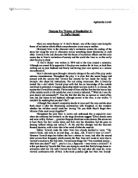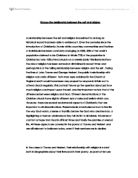Carey believes that reportage has a massive impact on human consciousness, and that mass communication is “the greatest change… that has taken place in recorded history.” In this sense, he argues, it is a revolution in mental activity and the natural social successor to religion. Carey also believes, however, that reportage has a cultural value, which places it in direct confrontation with literature. The latter is more commonly perceived as a superior form of writing, certainly by intellectuals and literary institutions. Creativity is often considered the measurement of a story’s cultural significance, something Carey dismisses as “magical thinking.”
The argument that reportage cannot be perceived as culturally important is derisory and unjust. Whilst creativity is a valuable trait, reality can often throw up more surprises than the human imagination can actually conjure up. The phrase, “you couldn’t make it up,” frequently applied to such events as 9/11, often holds true. Indeed, some of the most culturally significant writings are penned by people who can say, “I was there.” Whilst literature is an escape from the real world, reportage cannot be read in the comforting knowledge that it is only a story. For example, in Sophia Litwinska’s account of the holocaust, she writes, “about half-past five in the evening trucks arrived and we were loaded into them, quite naked like animals, and were driven to the crematorium.” The lessons from this piece of writing are incalculably greater than any work of fiction.
Carey believes that reportage has valuable lessons for society and can alter human perception. He writes that it “may extend – in both directions – ideas about what it is to be a human being [and] may limit capacity for the inhuman.” These kind of moral fastenings are more commonly associated with literature and the belief that creativity is akin to a truth higher than the actual. However, people are able to learn more important lessons from what happens in the real world, rather than through make-believe. The reporting of the recent Iraq war has surely given people more important lessons than a novel based on the war would be able to. As the Archbishop of Canterbury said in his sermon at the remembrance service for those who died in the conflict, “we have to find out what we have learned, what now looks different, [and] where our integrity has been stretched or challenged."
Coupled with the importance of the lessons reportage can and should deliver, is its ability to have an extensive reach. It is estimated that 80 per cent of adults in Britain read at least one national newspaper regularly and 75 per cent read a Sunday newspaper. Although TV news audiences may be in decline, the radio also remains an important source of news for most people and there are hundreds of increasingly important online/Internet services. Many people who are reached by this reportage are untouched by literature, hence Carey’s argument that the cultural significance of reporting is unsurpassed by literature. He explains that “reportage supplies modern man with a constant and reassuring sense of events going on beyond his immediate horizon.” It is in this context that its lessons are more telling and that it has an incalculably greater potential.
Although intellectuals and literary institutions may deny reportage the status of literature on unjust arguments that creativity is superior, there are other defences to their claim. Whilst Carey criticises literature for allowing a “precious illusion of freedom,” a lot of reportage does not affect the individuals who read it. This may go some way to explaining the lack of international news in newspapers, even since 9/11. A journalist is trained that the first paragraph of his story is the most important, as the reader may well not continue much farther if it is of no interest. In this sense, reportage might as well be fiction. Indeed, so often it is just that, with only today Nicole Kidman accepting undisclosed libel damages from “The Sun” newspaper over incorrect love affair allegations. Sometimes, unlike what Harold Evans wrote, the abstract is not another world.
Brian MacArthur wrote “journalists feed the dreams of the masses,” and therefore, it is questionable that wide-spreading reportage should be considered superior to literature. For example, the press frequently names rape suspects should they be famous individuals, which does not promote positive lessons for society. With the ever-increasing amount of daily reportage available, it is possible to draw comparisons with Michael Frayn’s 1977 novel, “The Tin Men,” in which computer programmers organise a mass survey of what people want to read and then produce popular daily newspapers based on this information. In contrast to Carey’s argument therefore, the growth of reportage does not always make literary lessons obsolete.
It should not be argued that creativity is the sole measurement of a story’s cultural significance. The writing of actual events is often as compelling as it is educational. Reportage is able to communicate valuable lessons in reality to the masses in a way that creative writing cannot. Nonetheless, it is unfair to dismiss literature simply because it is not real. Even the best reportage can be biased, inaccurate or simply poorly written. However, whilst literature will always be able to teach worthy cultural lessons, Carey makes a valid argument that reportage is a different but equally valuable form of writing.
BIBLIOGRAPHY
CAREY, JOHN (ed.) THE FABER BOOK OF REPORTAGE
Faber and Faber, London, 1987
EVANS, HAROLD ESSENTIAL ENGLISH FOR JOURNALISTS, EDITORS AND WRITERS
Fully Revised Edition, Pimlico, London, 2000
MacARTHUR, BRIAN DEADLINE SUNDAY
Hodder & Stoughton, Kent, 1991
RUDIN, RICHARD & AN INTRODUCTION TO JOURNALISM
IBBOTSON, TREVOR
Focal Press, Oxford, 2002
J. Carey, The Faber Book of Reportage, p.xxxviii
J. Carey, pp. xxxvi-xxxvii
J. Carey, pp. xxxvi-xxxvii
H. Evans, Essential English for Journalists, Editors and Writers, p.xii
S. Litwinska, A Survivor is Questioned from The Faber Book of Reportage, p. 554
Source: http://news.bbc.co.uk/1/hi/uk/3182132.stm
Source: R. Rudin & T. Ibbotson, An Introduction to Journalism, p.1
Source: http://www.sky.com/skynews/article/0,,30000-12825251,00.html
B. MacArthur, Deadline Sunday, p.6







